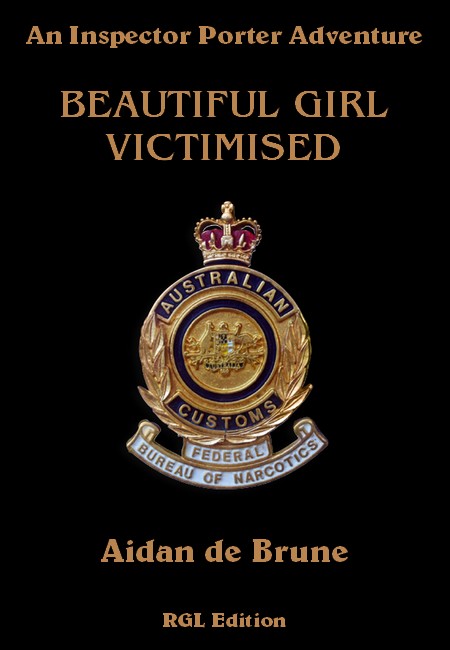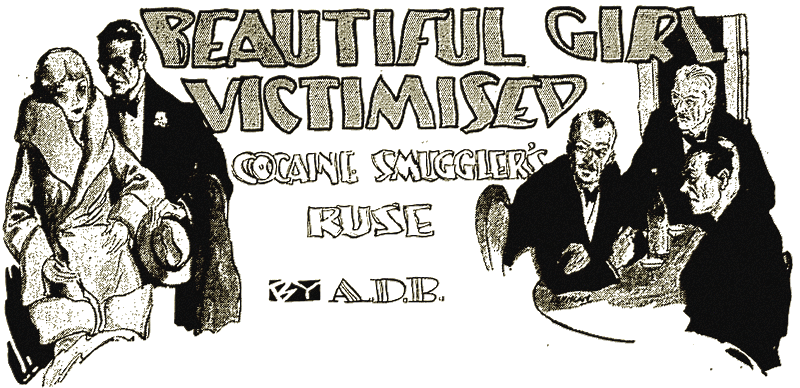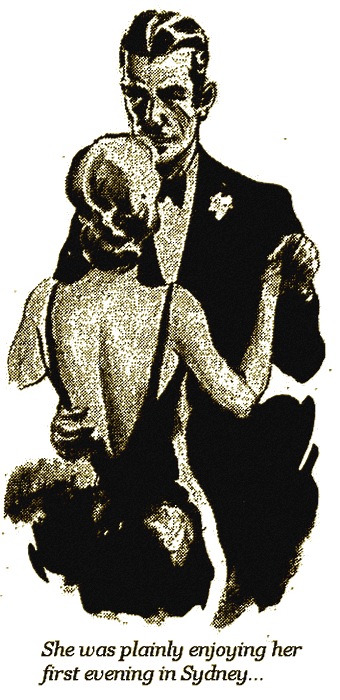
RGL e-Book Cover©
Roy Glashan's Library
Non sibi sed omnibus
Go to Home Page
This work is out of copyright in countries with a copyright
period of 70 years or less, after the year of the author's death.
If it is under copyright in your country of residence,
do not download or redistribute this file.
Original content added by RGL (e.g., introductions, notes,
RGL covers) is proprietary and protected by copyright.

RGL e-Book Cover©
In 1931 Aidan de Brune wrote a series of stories for The World's News, Sydney, featuring an Australian Customs inspector by the name of Joe Porter.
The stories were given headline-style titles and sub-titles and printed with illustrated headpieces. Some included an in-text illustration. The byline under which the stories appeared was "A.D.B." The titles and publication dates were:
• Proof of the Pudding: The Dope in the Duff (8 Jul 1931)
• The Wedding Cake: Clever Drug-Running Ruse (12 Aug 1931)
• Wiles of a Heathen Chinee: Customs Officer Innocently Smuggles Opium (2 Sep 1931)
• Beautiful Girl Victimised: Cocaine Smuggler's Ruse (23 Sep 1931)
• The Elusive Mr. Chon: Smart Smuggling Scheme (4 Nov 1931)
The RGL editions of the Joe Porter stories were built from files found in the digital newspaper archive of the National Library of Australia. Thanks and credit go to the Australian bibliophile Terry Walker for locating these stories and making them available for publication in RGL.
—Roy Glashan, 7 April 2021

CUSTOMS-INSPECTOR JOE PORTER was not at ease. Clad in irreproachable evening dress, he was seated at a table in the Romanesque Restaurant, moodily watching the couples on the dancing floor.
Particularly his eyes followed one couple; a man and a girl. He knew the man well; Paul Scagalli, one-time of Italy, now a habitant of the underworld of Sydney, N.S.W., Scagalli had just returned from a short enjoyment of State hospitality.
The girl was different. Young, about twenty-three years of age; exceedingly blonde, with a strangely transparent complexion. She wore very little makeup—except for the vivid red of her lips. Even the inspector's masculine eye noted that her dress was no copy; it was an original of one of the kings of Parisian fashion.
What was such a girl doing with Scagalli? The inspector had first seen her that morning when the Moritovian had steamed up Sydney Harbor. Something about the girl had attracted his attention. He had watched her leave the ship, entering a taxi outside the wharf gates. Instinctively he had noted the car's number. Later in the day he had interviewed the driver, and discovered that the girl had driven to a block of flats in Darlinghurst. The man had said that the girl had evidently been expected there; yet the flat had not been previously occupied.
Curiosity had induced him to journey to Darlinghurst that day, after he had signed off work. He had arrived outside the building just as the girl and Scagalli had emerged and entered a taxi. A little manoeuvring and he had learned that they were going to the Romanesque He had taken a taxi home, dressed quickly, and hurried to the restaurant.

Moodily watching the fox-trotting couple, he had wondered what Sergeant Westerham, of the Drug Squad, would say if he found him in that place. Westerham was intensely jealous of the Customs officials coming into the city on the trail of the drug-runners. He had openly stated that he considered the Customs officers' work ended at the wharf gates—yet did not refrain from sharply criticising their "ineptitude" in allowing so much illicit drug to get into the city.
Again Porter's thoughts went to the man and the girl. She was plainly enjoying her first evening in Sydney; glancing up smilingly at her tall, good-looking partner. From her intonation he judged her to be English. At the wharf he had managed to handle her luggage. She was apparently well off; for her clothes were of excellent quality, and mainly recent acquisitions.
He would have passed her with but a cursory glance—an admiring glance, true, due to her beauty—but for the taxi driver's report. Why he had sought out and questioned the man he could not understand; possibly his curiosity had been awakened by some chance, unremembered word. He had become curious regarding a girl who drove straight from the ship to a prepared flat; taken for her by—whom?
He had gone to Darlinghurst out of sheer curiosity—to be staggered by the appearance of Scagalli.
Paul Scagalli! For years there had been war between the Italian and those engaged in combating the drug trade of Sydney. For years Scagalli, a known smuggler, had openly defied his department and the police. Only once he had slipped.
Now the man was again free; and almost his first acts of freedom were to welcome this girl to Sydney and take her to supper-dance at the fashionable restaurant. The presence of the man with the girl was almost conclusive evidence of her complicity in "the trade."
Something drew Porter's eyes from the couple to the door. He started slightly. Two men were entering. Beneath their correct, conventional attire he recognised Sergeant Westerham and Plain-clothes Constable Malcolm.
What was Westerham doing there? The inspector frowned. Was he, too, on the Italian's trail? It almost seemed so. As the men halted in the doorway, Scagalli and the girl danced past them. Westerham raised his brows and muttered something to his companion, who nodded.
The men started to circle the dancing floor, preceded by an obsequious waiter. Porter waited until they were level with his table, then muttered a low greeting.
"Suffering cats!" The sergeant turned to his companion. "Look what's here?"
"Buttin' in, as usual." The inspector growled. "Well, you may as well sit here as elsewhere. Can keep an eye on the pair of you then. There's a blonde...
"Seen her, boy!" Malcolm chortled. "Some girlie, eh... and what does Mrs. Porter say?"
The inspector ignored the remark. The three men sat silent, Westerham studying the menu. At length he ordered. When the waiter was out of hearing, he leaned across the table.
"What's the joke, Joe? This isn't the docks."
"Jesse! Can't a man have an evening off?" The inspector simulated indignation. "Suppose you're on duty—in glad rags?"
Apparently engaged in idle conversation, the three men sat on, stealthily watching the couple. Midnight came and the girl rose, turning to her chair-back, over which hung her cloak. Scagalli sprang to her assistance. She laughed up at him as he spread the cloak over her bare shoulders, then turned to the door.
"Quick; trail them?" Porter turned to the constable. "Westerham, you remain here...."
As the man and girl moved out of sight, Porter crossed the room and seated himself at the table they had vacated. For some moments he remained motionless, then changed to Scagalli's seat.
A few minutes later he rejoined Westerham. The sergeant looked inquisitive, but Porter shook his head negatively
"Malcolm trailin' them?" he asked. Westerham nodded.
With a beckoning gesture the customs man turned to the door, followed by the sergeant. On the street, he hailed a taxi and gave the girl's address. He refused to talk during the Journey.
Outside the block of flats they found Malcolm pacing the pavement.
"What luck?" asked Porter, shortly.
"Drove her home and went in with her," the constable reported briefly. "What's the joke, Joe? You're damned mysterious this even'ng."
"Let it ride, Bill," Westerham ordered suddenly. "Joe knows, or guesses, something."
For nearly an hour the three men waited, concealed in nearby doorways. At length Scagalli appeared on the steps before the building. He glanced up and down the road, apparently looking for a taxi. One came in view and he raised his stick.
"Paul!" Porter spoke sharply from where he was concealed.
The man turned suddenly, shifting his stick to his left hand. Over that arm hung a long, dark overcoat. He looked puzzled when he found no one near him. For a moment he hesitated, then went to the taxi at the curb. As he made to enter, Malcolm sprang behind him. On the opposite side of the car Westerham wrenched open the door and barred the way. Porter come out of his concealment and strolled to the taxi-door.
"Take him to Central, Sergeant," he said carelessly. "I'll be along in a few minutes and make the charge."
He waited until the taxi was out of sight, then made his way to the girl's flat. Half an hour later he came out, to find Malcolm waiting for him in the corridor.
"All O.K., Bill?" he asked; then at the man's answering nod: "Just entertain this little lady, Miss Treviss, until Westerham and I return. We've got the goods, all right—but she's not in it. Just one of the gang's 'dumbs'."
At Central Station he went to the room where Westerham and his prisoner waited. Without speaking Porter strode across the room and took the man's overcoat.
"Gettin' on in the world, Paul," he laughed confidently. "Business good at Long Bay—so good that you can't afford to dress your wife—your wife—in anything but the latest Parisian modes, eh? Didn't know you had a wife, Paul—until the little lady told me."
He held up the coat by the collar-tab and shook it. A long, shimmering line of soft-colored silk slid to the floor. Porter looked at the sergeant, a quizzical smile on his lips.
"There's the goods. Sergeant."
"What the—"
"Couldn't get the trick until I heard a woman in that dancing dump say that petticoats were all the fashion now. Then I kept my eyes open. All the women had petticoats—they showed while they were dancing; didn't flare out like their dresses did. Guessed they were weighted at the hems—and if weighted, why not—you know."
"Petticoats!" the sergeant gasped.
"Petticoats, yes." The Customs man grinned. "Know what a petticoat is? No, perhaps they were before your time. I know, that comes of being a husband—you're not one. If you were, you'd know that women's chatter is always valuable—though some husbands 'ud take persuading to that! Any way—"
"But—petticoats!" Westerham could not grasp the fact.
"Sure! Have nice hems all round; hems that can hold quite a lot if properly packed. The little lady, Miss Treviss, told me that she was introduced to a man in London, who, on hearing that she was coming out to Australia, asked her if she would bring some of the new-fashioned petticoats to a Sydney friend. Said his friend wanted to surprise his wife with a present of the latest Parisian model petticoats, direct from Paris. Paul's that friend, but I ain't yet met his wife."
"But—this petticoat—" The sergeant had found the store of drugs.
"That petticoat—and others." The Customs man grinned. "There's quite a number in the young lady's charge, waiting for Scagalli to call, to-morrow, and take them to—to his wife." He frowned suddenly. "There's one thing I'm wild about, though."
"Wild—after a catch like this?" The sergeant gasped.
"Yes, wild." Porter shrugged. "Got sight of the little lady on the boat and wangled to examine her luggage. Let pass quite a lot I could have put the cross on. These petticoats for one thing."
"Whew!" The sergeant whistled. "So it's 'gentlemen prefer blondes,' eh? Now, Mrs. Porter—"
"Oh, finish it if you must. 'But they marry brunettes.' I did! Mrs. P.'s got no cause to shout!"
Roy Glashan's Library
Non sibi sed omnibus
Go to Home Page
This work is out of copyright in countries with a copyright
period of 70 years or less, after the year of the author's death.
If it is under copyright in your country of residence,
do not download or redistribute this file.
Original content added by RGL (e.g., introductions, notes,
RGL covers) is proprietary and protected by copyright.